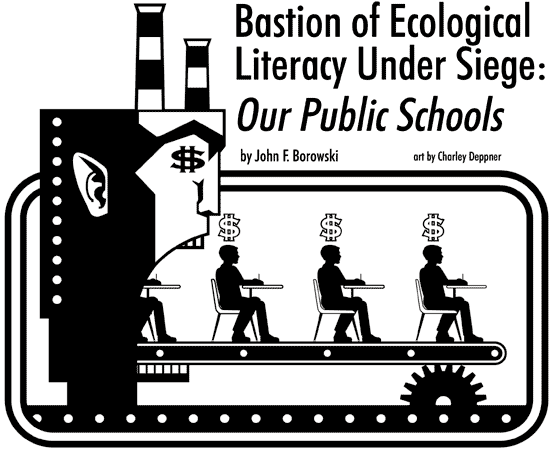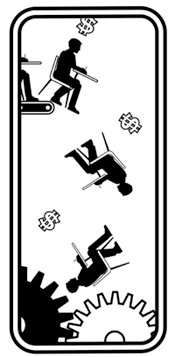Donate to IMPACT
Click below for info


• Ecological Literacy
Under Siege
• Quickies
(music reviews)

• E-Mail Comments
• Archives
• Subscribe to IMPACT
• Where to Find
IMPACT
• Buy IMPACT T-Shirts
• Ordering Back Issues
• Home |

A Ford Motor Company donation of $1.5 million dollars to "Provider Pals" epitomizes the quest for extractive industries and their attempt to dominate the last uncommercialized bastion: our public school system. Provider Pals is the latest scheme to circumvent the objectivity and sound science found in schools and to replace it with nothing short of corporate America's wish list. As a teacher, this is where I become fearful. Will untrained teachers see the need to balance these materials with other viewpoints? And will these teachers, woefully unprepared to teach a unit on pesticides, turn only to a "package" of videos, lesson plans and readings from the American Farm Bureau, an avid booster of chemical-based agriculture? Especially if these "dubious" educational resources are found at prestigious conferences, teachers often believe that they must be reliable sources of information.
Teachers are struggling with inadequate budgets and overcrowded classrooms. "Free curriculum" is often a blessing, an opportunity to bring new and exciting materials into science courses. Yet, the untrained teacher who doesn't have a grasp of the complexity of ecological issues may, in turn be aiding and abetting this propaganda campaign.
In the last several years, I have watched literally a torrent of corporate sponsored materials enter our schools: coloring books by the coal industry, biotech giants proclaiming that genetically engineered foods are needed to feed a growing population, logging interests downplaying the vast clear cuts that scar our public lands. And the recent Ford Motor Company donation to Provider Pals illuminates the reach into our schools corporate powers are seeking.
Provider Pals, organized by Bruce Vincent, an outspoken defender of logging, mining and grazing on public lands, is brilliantly orchestrated with a charismatic, yet simple objective: put a face on miners, loggers and ranchers--a very happy face, indeed. Bringing his minstrel show to urban areas, Vincent and his happy band of "providers" apparently show the "city kiddies" how wood, meat and other resources are brought to the market. Central to this theme is the pretext that no good American would criticize American icons like the cowboy and the logger.
Industry has often used workers as pawns; millions of dollars were spent on the timber corporation's PR ploy to pit loggers against spotted owls. The loggers were not the bad guys. It was the likes of Boise Cascade and Weyerhaeuser who butchered millions of acres of watersheds, fragmented forests on a scale never seen before and used "cut and run" techniques, caring little about workers and their communities. Deforested lands surround my community, a small logging town in Oregon, but to even broach that subject in our local high school is seen as sympathy to environmental zealots rather than a logical step in reaching sustainable forestry techniques.
The irony of programs like Provider Pals is that while they tug at our "heart-strings" and have a valid message in terms of good, hard-working rural folk, the omissions in the classroom are akin to a corporate commercial. Will the urban kids be made privy to information about predator control and vile, toxic substances like Compound 1080 (one of the world's most lethal chemicals) that are used by grazing interests to destroy our nation's predators? Will the logger character discuss the fact that only 4% of our native forests still stand, or that tree farms and massive clear-cutting have lead to our current fire dangers? Will the miner expose the 1872 Mining Law, which leads to legal theft of hard-rock minerals, while companies pay no royalties and the public picks up the cost of abandoned mines? On all cases, the answer is very doubtful.
While the Provider Pals have the right to give their viewpoints, is it good education to intentionally omit the whole picture? Case in point: I teach ecology, and I teach about the value of natural predators. If I were to receive "Living with Wildlife" worksheets from the Department of Agriculture's Wildlife Services and distribute them in school, I would skew the children's view of predators as nothing more than vicious and dangerous animals. Their worksheets and accompanying 27-minute film let children see predators as problems to be poisoned, trapped and burned out of their dens. There are no discussions about the majesty of wolves and bears, no clarification that attacks on humans by predators are rare, and no indication that the ecological role of predators is to control prey species, improving the gene pool of prey by removing the weak and eating disease-causing carrion. In teaching ecology, I strive to teach all of the data, all the perspectives on an issue, and then let the children decide for themselves. Education that is "canned" and has an agenda to fulfill only muddles critical thinking skills.
If Mr. Vincent's puppet show doesn't work, he can follow the lead of the American Petroleum Institute. Exposed by the New York Times for trying to create "junk science" curricula, to downplay global warming, and cast the Kyoto Protocol into the same category as leprosy, API tried the clandestine route: seek cover from an established charlatan. It helped fund a module on energy for Project Learning Tree, an educational program funded by the American Forest Foundation. Project Learning Tree, fond of ignoring forest issues like clear cutting, monocultures, short rotation forestry, and the track record of multinationals on public lands, is a powerful player in environmental education with the backing of the nation's most powerful and ecologically unsound timber corporations. In the absence of big environmental organizations providing sound curricula, teachers are being bamboozled into using PLT materials and its omission-filled agenda.
Sitting on the "panel" for this illustrious energy packet were the American Coal Foundation, the Alliance of Automobile Manufacturers, and the American Petroleum Institute. API President Red Cavaney sat on the panel himself, and he is an avid supporter of opening the Arctic National Wildlife Refuge. The American Coal Foundation has been chastised for its previous foray into science curricula. "Power from Coal" was cited by educators as commercial and incomplete, downplaying the effects of carbon dioxide and actually suggesting that the earth could "benefit rather than be harmed from increased carbon dioxide." Lastly, the Alliance of Auto Manufacturers is fighting California's attempt to regulate emissions from cars to combat global warming. With this powerful lineup of pro-fossil fuel players, how can I balance the scales during a classroom discussion? Obviously, I must either be fluent in potential alternative energy sources--like wind, solar, or geothermal--or my students will be denied the tools to make decisions about energy.
 While the fortress of public schools has withstood these attacks, the cracks are showing. Growing state deficits mean less funding for curricula. Educators are being tempted to use corporate curricula that offer a "fast food approach" to learning: the questions and answers are the best that industry can cook up, similar to corporate profit sheets and exaggerated financial gains. Corporate America knows that as long as students have literacy in environmental issues, there will always be Rachel Carson and Cesar Chavez types in the American lexicon. And that is not permissible in a corporate-run world, where knowledge is seen as a roadblock to quarterly profits. While the fortress of public schools has withstood these attacks, the cracks are showing. Growing state deficits mean less funding for curricula. Educators are being tempted to use corporate curricula that offer a "fast food approach" to learning: the questions and answers are the best that industry can cook up, similar to corporate profit sheets and exaggerated financial gains. Corporate America knows that as long as students have literacy in environmental issues, there will always be Rachel Carson and Cesar Chavez types in the American lexicon. And that is not permissible in a corporate-run world, where knowledge is seen as a roadblock to quarterly profits.
Yes, it must be frustrating for certain corporations. They have unfettered access to the airways, given their monopoly on the television. Their pockets are deep and massive sums of money can be afforded to propaganda campaigns. American culture is increasingly being dictated by our citizens' dizzying compliance to fulfill their ego and spiritual satisfaction through consumption and paying less and less heed to meaningful dialogue about the consequences. But there has always been that outpost of hope, a roadblock if you will, that prevents free education from becoming "owned-and-paid-for education."
Our public schools offer our youngest citizens access to scientific information not tainted or presented with outcomes already determined. Discussion and critical thinking, in the absence of corporate come-ons, will determine the best possible road to sustaining resources for eons to come. And if this bastion gives way to the knaves who would manipulate their own mothers to generate greater stock options, then we as a free and just society will see democracy erode and blow away as so much dust found in a clear-cut, overgrazed prairie or neglected strip-mine.•
John F. Borowski is a marine and environmental science teacher and has been an educator for over 24 years. His articles have appeared in Common Dreams News Center, the New York Times, Z Magazine and the UTNE Reader.
Email your feedback on this article to editor@impactpress.com.
|




